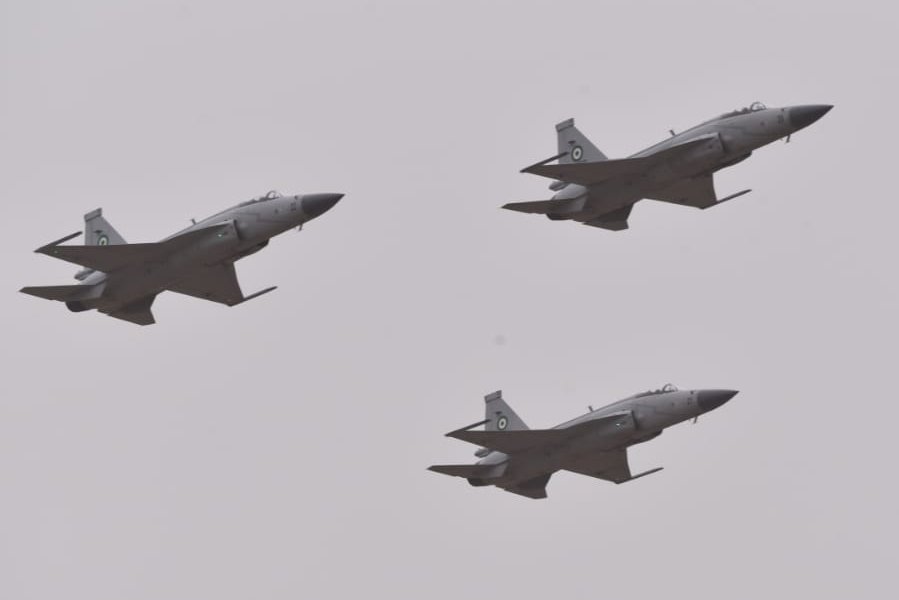ADF STAFF
Air Marshal Hasan Abubakar recently said the Nigerian Air Force is experiencing a “Golden Era,” marked by the acquisition of advanced platforms, including jets and helicopters.
Mandated to protect the country’s sovereignty and territorial integrity, the NAF is surrounded by threats of terrorism with the Boko Haram insurgency in the Lake Chad region to the east and the encroachment of several extremist militant groups affiliated with al-Qaida and the Islamic State group in the Sahel.
Abubakar, the NAF’s chief of staff, has said Nigeria expects to have the third largest air force on the continent in the next two years.
“The Nigerian Air Force has witnessed a remarkable transformation, evident in the revitalization of our fleet and enhanced operational readiness,” he said to reporters on January 9.
Abubakar said the NAF recorded 9,928 sorties and 15,915 flying hours over the past 18 months of counterterrorism and other security operations.
“The Nigerian Air Force has evolved over the years from a basic tactical air force in the ’60s and the ’70s to an air force today that is capable of conducting strategic operations whenever required,” he told reporters during the NAF’s 60th anniversary celebration in May 2024.
Abubakar lauded the NAF’s expanding fleet and capacity-building programs in its efforts to restore stability to the insurgency-plagued Northeast region.

Speaking at the 2024 NAF Training, Operations and Safety Seminar in Abuja on December 4, 2024, he also pointed to the training of 54 pilots abroad and 43 locally, along with 16 unmanned aerial vehicle (UAV) operators trained locally.
The NAF received 14 advanced aircraft in 2024, part of the total 64 aircraft the NAF expects within three years.
The force has 18,000 personnel, which is second most on the continent behind Egypt, according to the International Institute for Strategic Studies’ annual Military Balance 2024 report.
It also has 179 air platforms, including 117 aircraft (61 of which are combat-capable aircraft), 55 helicopters and seven heavy UAVs.
Security analysts Samuel Oyewole, Francis Okpaleke and Oluwole Ojewale said the NAF has undergone a program of “massive procurement and delivery of air assets and capacity building.”
“The expansion of the fleet comes at a critical time, when military readiness is necessary to counter emerging regional and transnational security threats,” they wrote in a January 14 article for The Conversation Africa magazine.
That upgraded fleet likely will be critical to the Economic Community of West African States, which typically looks to Nigeria for leadership, to establish a standby counterterrorism force.
“The Nigeria military could play an important role by providing its air force assets for intelligence, surveillance and reconnaissance, transportation, close air support and precision strikes in terrorist strongholds,” the researchers wrote. “It is also key in building capacity for the air forces of other members of the bloc, and championing innovation through research and development.”
Abubakar said the NAF’s overall strategy is to develop critical national security capabilities and enhance core competencies through innovation and collaboration. He frequently gives thanks and credit to a host of international partners, including the United States.
The NAF’s fleet of 12 A-29 Super Tucano light attack aircraft stationed at Kainji Air Base is part of a $500 million purchase deal with the U.S. military.
Nigerian Minister of Information and Culture Lai Mohammed called the Super Tucanos “game changers.”
“Most of the successes we have recorded in recent times is because of the acquisition of new platforms, not limited to the Super Tucano,” Mohammed told Nigerian online newspaper Premium Times.
Since the first batch of A-29s arrived in 2021, they have helped Nigeria turn the tide against Boko Haram and the Islamic State West Africa Province (ISWAP) extremists. They are used mainly for attacking enemy targets, intelligence gathering, surveillance and reconnaissance.
“Air power has helped the Nigerian military to locate and neutralize numerous camps and logistics of Boko Haram insurgents,” the three researchers wrote. “It has helped them eliminate thousands of Boko Haram fighters, protect ground forces and rescue thousands of hostages since 2013.”








